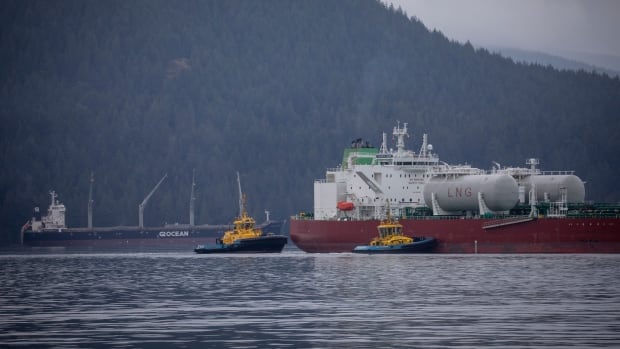
Vancouver tanker traffic increases tenfold after TMX project
CBC
Data collected by a Simon Fraser University professor shows that tanker traffic in Vancouver's Burrard Inlet has increased tenfold since the expanded Trans Mountain pipeline came online this summer.
According to David Huntley, a professor emeritus at SFU's physics department, publicly available data shows that an average of two tankers loaded oil from Trans Mountain's Westridge Marine Terminal until May of this year.
However, in June and July, the numbers increased to an average of 20 tankers a month, with Huntley saying a similar number is in the cards for August.
The professor's data has been corroborated by Trans Mountain, which told CBC News in an email that it has loaded 65 vessels since the pipeline finished its expansion project in May, and large volumes of oil began flowing from the Alberta oilsands to the Port of Vancouver.
The steep rise in tanker traffic is raising alarm among activists and the B.C. government, who both say they are concerned about the effects of an oil spill in Metro Vancouver's waterways and shorelines.
"It's a very sudden change, which, of course, is to be expected because there's an awful lot more oil [that] can be sent down the pipe," Huntley said.
The $34-billion Trans Mountain pipeline expansion has been controversial ever since the federal government bought it in 2018, with the project set to nearly triple the flow of crude oil from Alberta to Canada's Pacific Coast to around 890,000 barrels per day.
Pipeline production volumes will increase gradually until it is running at full capacity in 2025-2026, Trans Mountain said in March.
On Sunday, environmentalists protested the increasing tanker traffic in Vancouver due to the oil shipments.
"This company and this government are willing to put the people here at risk because they want more profits. This is morally repugnant," said Tim Takaro, an SFU professor emeritus of health sciences, who has previously been jailed for his protests against the pipeline.
"We demand that the government stop shipping these tankers through these waters until there is a plan to protect the people. And to be honest with you, that plan, of course, must include the end of the fossil energy industry here in Canada."
In a section on its website, Trans Mountain says it is working with the Western Canada Marine Response Corporation (WCMRC) to prevent spills.
The WCMRC says it has over 200 responders and 80 vessels ready to jump into action in the event of a spill and multiple response bases operating 24/7.
However, it's not just activists raising concerns over the impacts of a potential oil spill on Vancouver's coastline.

 Run 3 Space | Play Space Running Game
Run 3 Space | Play Space Running Game Traffic Jam 3D | Online Racing Game
Traffic Jam 3D | Online Racing Game Duck Hunt | Play Old Classic Game
Duck Hunt | Play Old Classic Game